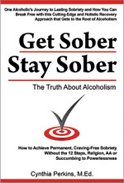Addiction and Spirituality
Of course, we can't talk about addiction without talking about spirituality. Although I would disagree with the view from traditional treatment and the 12 step programs that alcoholism, or addiction in general, can be treated successfully with a spiritual program, it is indeed true that spirituality is affected deeply by addiction and poor spiritual health can perpetuate addiction, because the neurotransmitters that are involved with addiction are also the roots of our spiritual health.
Before we go any further, lets first establish a definition of spirituality. Spirituality can mean many different things to different people, but on the most fundamental level, spirituality is basically a voyage of self-discovery that helps you achieve inner peace, meaning and purpose in your life, a higher level of awareness or consciousness, more authenticity, a deeper understanding of and relationship with yourself, the Universe and the people in your life and the ability to live according to your true inner desires and principles. It may or may not include a relationship with a higher power.
The relationship between addiction and spirituality is complex and multi-faceted, but one that is not clearly understood by the masses. On one hand, if you are empty spiritually you will seek out artificial means to fill the gap, and yet addiction itself eventually leaves you empty on the spiritual level. To understand why this is so, we take a look at neurotransmitters in the brain.
The Biochemistry of Addiction and Spirituality
As you have learned on the pages of this website, neurotransmitters are electro-chemicals used by the brain to govern pretty much every aspect of our life, including how we think, feel and behave. Dopamine, serotonin, GABA, endorphins glutamate, histamine and norepinephrine are the neurotransmitters that would have the most influence on our spiritual health, and it just so happens, these are the same ones that are at the root of addiction.
We are provided with feelings like connection, happiness, satisfaction and self-esteem from serotonin and feelings of joy, self-confidence, ability to pay attention and experience pleasure, ambition and contentedness from dopamine. GABA is like a natural sedative that soothes and quiets the mind, and relieves anxiety, while endorphins help modify emotional and physical pain, increase self-esteem, joy, and the ability to relax and make you feel empowered.
Each one of these neurotransmitters is responsible for peace of mind and feelings of overall well-being, serenity and inner peace and are slightly euphoric. When one consumes a psychotropic substance, it stimulates an intense surge in at least one or more of these neurotransmitters, which produces an extraordinary and compelling euphoria, known as "being high." On-going artificial stimulation of neurotransmitters leads to a cut back in production, which results in depletion and then dependence on the drug of choice to compensate for the depleted neurotransmitter, because of its ability to mimic the effects of the neurotransmitter.
Norepinephrine is needed to help us focus, pay attention and be motivated, however, it is actually toxic to the brain when it is in excess, which causes irritability, fear, anxiety, despair, turbulence, misery and disconnection from self, others and the Universe. Glutamate and histamine are also critical for proper brain function and mood, but in excess they lead to a wide array of neurological problems and emotional turmoil like anxiety, fear, paranoia, dissociation, OCD, depression, aggression, and much more.
A lot of the population actually has an overabundance of norepinephrine, glutamate and histamine, and not enough dopamine, GABA, endorphins, or serotonin, because of a nutrient deficient diet, exposure to toxins, on-going stress and psychotropic substances; hence, why such large a part of our society feels disconnected and lost spiritually.
In my view, neurotransmitters are what determines our level of spiritual health, because if they are depleted, disrupted or in excess, then you are incapable of experiencing inner peace, contentedness, and serenity; feeling connected to yourself, those around you, the Universe, your higher purpose or whatever spiritual beliefs that you hold dear; or living according to your principles and having the depth of meaning and purpose in your life that you desire. Without adequate neurotransmitter production and function, we feel flat, lifeless, empty, disconnected, unmotivated and lack empathy. The voyage of self-discovery is rudely interrupted.
What happens when we are missing the good feelings that our neurotransmitters provide? We seek them out in drugs, sex, video games, gambling, alcohol, caffeine, sugar, nicotine, etc., because all psychotropic substances have the ability to mimic our natural neurotransmitters. As anyone with an addiction knows, the primary thing we are seeking is inner peace, connection, wholeness and oneness; we are attempting to escape the black abyss, emptiness or deep hole that we feel inside ourselves. This goal cannot be achieved when neurotransmitters are not being produced in sufficient numbers or functioning properly, because it is the lack of neurotransmitters that creates the feelings of emptiness and darkness.
Have you ever thought about why it is so pleasurable for us to participate in spiritual activities like dance, meditation, prayer, attending spiritual ceremonies or functions, spending time in nature, lovemaking, yoga, breathwork, exercising, singing, spending time with our loved ones, or visualization? The reason is due to the fact that each and every one of these actions provides a boost in neurotransmitter activity; serotonin, dopamine, endorphins or GABA are stimulated and thus we feel somewhat ecstatic and blissfully connected. We encounter our so called "higher power," or "divine being" through our brain chemistry.
On the flip side, it is equally important to make a conscious effort at nurturing your spirituality, by engaging in a variety of spiritually fulfilling activities on a daily basis, like mindfulness, meditation, deep breathing exercises, communing with nature and filling your life with activities and people that make your life more fulfilling and deep. If one does not have meaning and purpose in their life, feels disconnected, or is not living in line with one's true inner desires or principles, this can create a lot of internal conflict that becomes a trigger for relapse.
When we have a rich spiritual life that makes life meaningful, gives us purpose and we feel connected to ourselves, our loved ones and the world around us, we don't have the need to seek fulfillment outside ourselves in drugs or alcohol. So, to some degree, spirituality and addiction is a two way street. Like most other issues involved in addiction, neurotransmitters and spirituality have a reciprocal relationship with one another.
You can't feel spiritually connected if you are continually disrupting your neurotransmitters with drugs, alcohol, sugar, caffeine, nicotine and a poor diet or being exposed to environmental toxins. However, if you are not spiritually fulfilled, you will continually reach out to drugs, alcohol, sugar, caffeine, carbs, or other feel-good substances to try and fill the void.
This is why a spiritual approach like a 12 step program or religion is helpful to some degree for people trying to overcome an addiction. The more spiritual activities that you engage in the more your neurotransmitters are stimulated, and thus staying away from your substance of choice becomes easier. However, spirituality all by itself is not enough to replenish neurotransmitters, and thus why relapse is the norm in traditional treatment. The root of the issue, "depleted neurotransmitters" is not addressed.
Neurotransmitters are not available in high enough numbers to be stimulated if one is not providing the body with the nutrients it needs to form them in the first place. One must continue to go to meetings or religious ceremonies on a frequent basis to keep themselves in line, but frequently falls on their face. Some people may even become addicted to spiritual techniques like attending spiritual seminars, retreats, Alcoholics Anonymous and church. When neurotransmitters are restored to balance, these crutches are not needed.
Addiction Stunts Psycho-Spiritual Growth
Psychotropic substances of all kinds have been used for decades by many to try and reach "alternate" or "higher" fields of consciousness and fuel spiritual growth. Back in the 60s and 70s drug use was thought to be a path to spiritual development and enlightenment and some people today still believe this to be true, but nothing could be further from the truth.
When mind altering substances are used to achieve higher spiritual states, it is artificial and cannot be sustained. They obstruct neuronal communication networks, dull your emotions, feelings, intellect and ability to engage fully in your life and impair your capacity for realizing your fullest potential as a human being. The longer one engages in mind altering substances then the more stunted they become in psycho-spiritual growth and maturity. Eventually it becomes impossible to achieve true inner peace and the voyage of self-discovery comes to a complete stand still.
Many people who have a thirst for truth, spiritual development, a higher level of consciousness and self-discovery, are often drawn to the artificial "spiritual effects" of psychotropic substances, because of their ability to propel us into what appears to be the fast-track to spiritual bliss. This is not true spirituality; it is a deceptive illusion.
The high that is experienced with drugs and alcohol feels spiritual, because they all stimulate neurotransmitters in the brain, but when the drugs are gone, so is the euphoric bliss and the connection with the divine. So, when drug or alcohol use wipes out neurotransmitters, as it inevitably will, it takes our spirituality with it - thus where the deep, all-consuming, black hole in the gut that every addict has experienced originates.
Initially psychotropic substances seem to be a super highway to the ultimate level of inner peace and oneness with the Universe, but it is short-lived and very quickly replaced with emptiness and a vicious chase for more. Just like most things in life, when you try to take a short-cut on something that requires time, you are likely to get into trouble. True spiritual growth requires that we are completely present for all of our experiences and that is only possible without the use of psychotropic substances.
Understanding these facts about addiction and spirituality is a vital component for long-term recovery. You must first provide the brain with what it needs to function properly and then nurture it with your activities to help it grow. Without addressing the brain it is like trying to grow a flower without first planting a seed.


